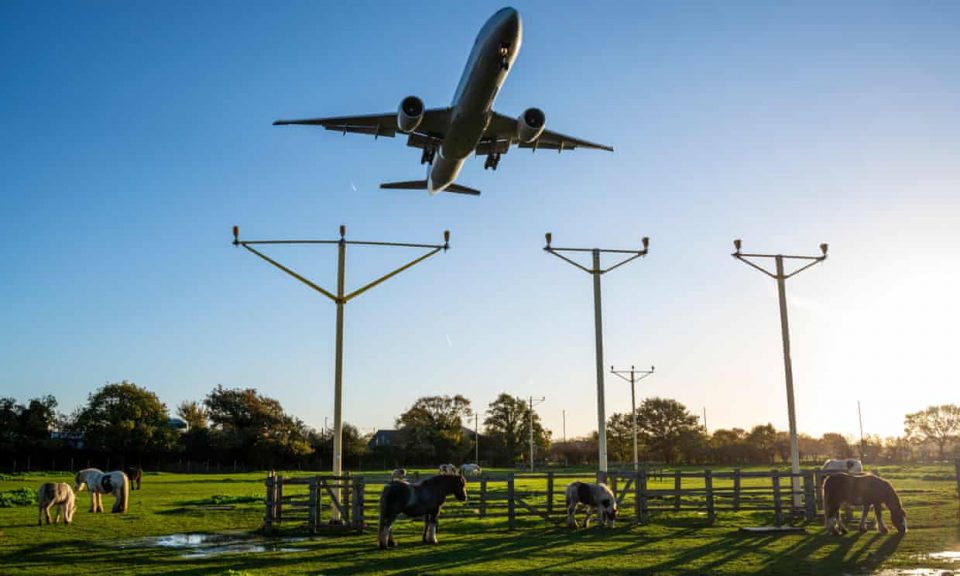Ladies and gentlemen, the captain has activated the “fasten seat belts” sign. Sir Keir Starmer and Rachel Reeves are not just facing significant turbulence near Heathrow; the flight deck has purposefully navigated Labour’s aircraft into the storm. This is quite a peculiar decision for a government already grappling with considerable unpopularity, and it’s a choice that many within their ranks find hard to comprehend. Frustration regarding the chancellor’s recent pledge to endorse the expansion of Heathrow and other airports is blending with confusion. Numerous Labour members are left pondering why she would want to expend political capital on a highly controversial initiative that won’t be completed until long after she departs the Treasury and Sir Keir leaves Number 10.
This was her decision, as well as his. She didn’t have to prioritize airport expansion in her significant address about economic growth. If the prime minister truly held authority, he could have intervened to halt his chancellor’s plans. One fallout from the outrage surrounding this issue is that it shifts focus away from her more positively received proposals aimed at rejuvenating the United Kingdom’s growth-starved economy.
Conversations about constructing new reservoirs or other aspects of her growth strategy have all but disappeared, overshadowed by the focus on airport expansion. Immediate backlash has been fierce and will likely persist for years, coming from several areas with which Labour has hoped to align positively. For the fervently concerned environmentalists, Heathrow serves as a critical test of whether the government is genuinely devoted to tackling the climate crisis. Supporting expansion is seen as a complete failure. They had hoped to believe in Ms. Reeves when she declared at the Labour conference that she would be as proud to become “Britain’s first green chancellor” as she would to be its first female leader. I would caution her against reiterating that sentiment, especially in green circles, unless she desires to be met with ridicule.
Another disappointed faction includes those who wanted to put their trust in the chancellor and prime minister when they portrayed themselves as different from their predecessors by claiming they would not be overly fixated on the south-east and would instead strive to distribute opportunity and growth countrywide. Ms. Reeves did make some remarks regarding revitalization in the north and the Midlands, but her primary focus was on Heathrow and reviving ambitions for an Oxford-Cambridge “growth corridor.” This gave the impression that she is heavily investing in large-scale projects in southern England. Labour mayors in the north are left disillusioned, as while she acknowledged the urgent need for new rail links and the enhancement of existing ones between northern cities, no concrete financial commitments were made to support them. She has voiced her support for a significant revamp of Manchester United’s Old Trafford stadium and its vicinity, yet again did not specify how that would be funded.
To these dissatisfied groups, we can add a third: Labour MPs and ministers whose outlook is increasingly pessimistic, envisioning a future filled with protests and resistance against Heathrow expansion in courtrooms, legislative bodies, and from opposing London residents and environmental advocates. The owners of the airport began lobbying for this more than two decades ago, yet it has consistently stumbled before even taking off. Successive administrations, stretching back to Tony Blair’s era, have floated, approved, then unapproved, reintroduced, and then canceled the project repeatedly.
There’s a compelling reason for the outbursts of enthusiasm to be followed by hesitance. In addition to the increased noise and air pollution that would affect a very densely populated area, there’s the significant issue of demolishing hundreds of homes, diverting multiple waterways, and rerouting a lengthy segment of the M25—the busiest motorway in Britain—while plunging it into a tunnel. “This will involve years of challenging political navigation,” one Labour strategist laments, indicating the London mayoral elections in 2028 as a point of concern.
The government might point to a few supportive voices, yet that support appears limited. Some business associations initially welcomed the announcement, only to quickly revert to complaining about the higher taxes being imposed on them by the chancellor. A group of ambitious Labour MPs is rallying behind her, yet many remain either antagonistic or confused by the decision. With a substantial majority, Sir Keir and Ms. Reeves could likely push it through parliament if they are resolute enough, but doing so will undoubtedly stir substantial discord and discontent within their own ranks.
Is the chancellor feeling rattled by the backlash and distress she has caused? Her aides suggest she is as indifferent to being unpopular as the average supporter of Millwall football club. They argue that the uproar surrounding the Heathrow announcement was no coincidence, but rather a tactical move meant to “shift the dial” among international investors, showcasing Ms. Reeves’s commitment to prioritizing growth over all else. One of her supporters articulated it succinctly: “Rachel’s identity as chancellor is that she confronts hard choices head-on, and this decision reinforces that identity.” She interprets dissent as an endorsement of her unwavering resolve to implement her new growth-at-all-costs philosophy.
Where is the cabinet amid all this? The chancellor’s associates claim they expected greater dissent within the cabinet than they actually encountered. A considerable portion of the cabinet—including Darren Jones, the Treasury’s second-in-command, and Sir Keir himself—previously opposed the notion of a third runway when it was last presented to parliament. One notable dissenting voice who continues to oppose is Ed Miliband, the government’s staunch advocate for net-zero policies, who has taken his grievances directly to the cabinet meetings. He has confided to friends that he is frustrated but has no intention of resigning. Should he vacate his position, Sir Keir would likely appoint someone less committed to tackling the climate crisis, thus removing a crucial ally from the government’s core and strengthening the Treasury’s position. Additionally, it seems the Net Zero Secretary believes that resigning would be a futile act of protest against a project that may never come to fruition, at least not in the foreseeable future.
The first major hurdle is obtaining planning approval. One can already hear lawyers eagerly anticipating the lucrative legal disputes that will accompany an extended inquiry process. Heathrow’s CEO, Thomas Woldbye, has admitted that aiming to secure approval for a third runway by the end of this parliamentary session is a tall order. It remains ambiguous how the government might align this expansion with its legally mandated net-zero objectives. Many argue that it simply isn’t feasible. Some studies suggest airport expansions could negate all the carbon reductions achieved through the government’s clean energy initiatives. Ms. Reeves confidently claims that flying will become “cleaner and greener” thanks to innovations in “sustainable aviation fuels.” However, experts highlight that these fuels are significantly more expensive than conventional jet fuel and currently available in very limited quantities. Debates around whether Heathrow expansion would realistically contribute to economic growth have led to wildly differing estimations regarding its costs. Projections from previous plans indicated a price tag of about £14 billion in 2014, but estimates have since ballooned to at least twice that—possibly even triple. If funds can be secured from investors willing to front that kind of cash, they will inevitably seek a return, leading to increased landing fees, which will likely be passed on to consumers as higher ticket prices. The chancellor asserts that, while not guaranteed, there is a possibility that planes will be landing at a third runway by 2035. This timeline eerily echoes the overly ambitious schedule promoted during the troubled saga of HS2.
Transforming the Oxford-Cambridge corridor into “Europe’s Silicon Valley” sets high aspirations and features its own share of controversies; however, that ambition at least has a credible basis for fostering growth. In contrast, advocating for Heathrow expansion appears to be a risky venture into political quagmire.
Andrew Rawnsley serves as the Chief Political Commentator for the Observer.



Jerod Mayo Delivers Powerful Message Following Patriots Victory – Sports Illustrated